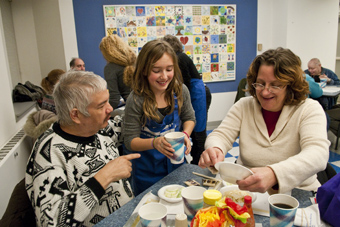A new twist on feeding the hungry
Permanent link
Photo credit: Bob Kusel
Until today, I had always thought of soup kitchens as gloomy establishments where the impoverished stand in line for hours to receive food rations in a method similar to the one employed in Oliver Twist. In high school, I avoided soup kitchens and found other ways to do service because I didn’t think I could handle seeing mass poverty up close.
But today I took a trip to the JUF Uptown Cafe with Northwestern Hillel’s Tikkun Olam Task Force, and all of my perceptions changed.
The JUF Uptown Cafe is Chicago’s first kosher anti-hunger program and is housed in the Dina and Eli Field Ezra Multi-Service Center in Chicago. The feeding program, which offers four meals a week to its registered clientele, is housed in a well-lit room with blue and white tiling and a diner-style layout. Volunteers act as waiters, taking drink orders from customers and carrying food to the table.
Jake Adler, who is the case manager for many of the attendees, said that the restaurant style gives people more dignity. They feel as if they’re going to a meal with friends because they enjoy the atmosphere, not because they are desperately in need of food. I saw this to be true as I watched large groups of people laughing and telling stories as they ate a full meal at a table decorated with flowers for Mother’s Day.
But the man that I was serving was sitting alone, eating his eggs and orange juice in silence. It wasn’t until I sat down to speak with him that I discovered he was deaf in one ear, and had trouble participating in group conversation. For the next 15 minutes, he told me all about his career in the restaurant business and his run as head chef in a Chicago establishment. He said can’t cook anymore because he doesn’t have a stove.
Another man that I served ate his meal and took another to go, asking for an extra bagel because he was “really hungry.” It was heartbreaking to have to deny him, but resources are limited and Jake had explained to us a fair rationing process. It really made me stop and think about what happens to these people when they leave the cafe, about what they do for every other meal.
The Ezra Multi-Service Center provides not only meals, but also movie nights, musical groups and health programming. The program caters to Jews and non-Jews alike and provides them with a case manager who monitors their physical and emotional health. According to Jake, everything that the JUF Uptown Cafe serves is kosher, being that about 40 percent of the people who attend meals are Jewish. He discussed with us the difficulties of trying to keep kosher when just finding food is a problem. It’s not something I ever thought about before today.
On the whole, I found my hour and a half of volunteering at the JUF Uptown Cafe a positive and enlightening experience. I feel informed about the struggles of the impoverished Chicago population and also grateful that programs like this exist. I appreciate JUF for all that it does in terms of outreach, and I commend the Tikkun Olam Task Force for getting Northwestern involved in the service opportunities available. I encourage everyone to find as many ways possible to combine faith and philanthropy, as being Jewish is not an individual identity, but a communal one.



.jpg)



